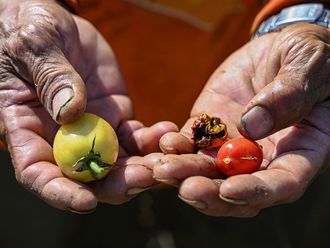Manila: The increasing loss of areas where marine life can thrive and regenerate is posing a serious threat to Manila Bay, a lawmaker said citing statement from experts.
Senator Loren Legarda, chair of the senate environment and natural resources panel, said Manila Bay’s capability to sustain marine life is being affected by habitat loss and degradation around the area.
She said diminishing mangrove forests, coral reefs and seagrass beds could impact the future of the bay.
“Mangroves are one of the most important ecosystems because they serve not only as nursery grounds for various fish species but also as shield from storm surges and rising sea levels,” Legarda said during a recent briefing by agencies tasked to clean-up Manila Bay.
Based on records from the Bureau of Fisheries and Aquatic Resources (BFAR), in 1890, some 54,000 hectares of mangrove surrounded the bay. After a hundred years, in 1990, only 2,000 hectares of mangrove remained. In 1995, this was down to 794 hectares.
The Manila Bay embraces the capital city and its environs providing a rich source of sustenance and livelihood for millions of Filipinos but, according to Legarda, this natural bounty would be lost if people take the environment for granted.
Legarda also stressed the economic benefits of the bay. A conservative estimate of the economic value of selected major uses of the Bay, such as offshore fisheries, aquaculture, ports and harbours, and tourism, places it at P8.7 billion annually (Dh741 million.
Garbage
The Senator lamented that about 1,500 tonnes of waste are illegally dumped daily on private land, in rivers, creeks and in the Manila Bay, according to a study by the Asian Development Bank.
Furthermore, previous audits undertaken by Greenpeace and EcoWaste Coalition showed that plastic bags and packaging make up at least 70 per cent of waste in Manila Bay.
“We must revisit the Ecological Solid Waste Management Act to see how we have been implementing this law, otherwise, all efforts to rehabilitate Manila Bay would only go to waste. Unless we learn how to manage our waste, starting with proper garbage segregation and disposal, we will never be able to clean our waters and our communities,” she said.
Legarda said that, based on studies by the Department of Environment and Natural Resources (DENR) and other government agencies, Manila Bay water pollution costs an annual P4 billion (Dh340 million) in coastal areas, which depend on it for food and livelihood. The health of those living within the bay’s watershed can also be affected by the polluted waters.
She stressed that cooperation between government agencies, local government units and citizens was necessary to rehabilitate Manila Bay, which affects the life and livelihood of 23 million Filipinos.
“Let us reclaim Manila Bay’s stunning beauty and proclaim its significance. And let us, above all, work towards a healthy, sustainable and disaster resilient future through concerted cleanup efforts,” the Senator said.












